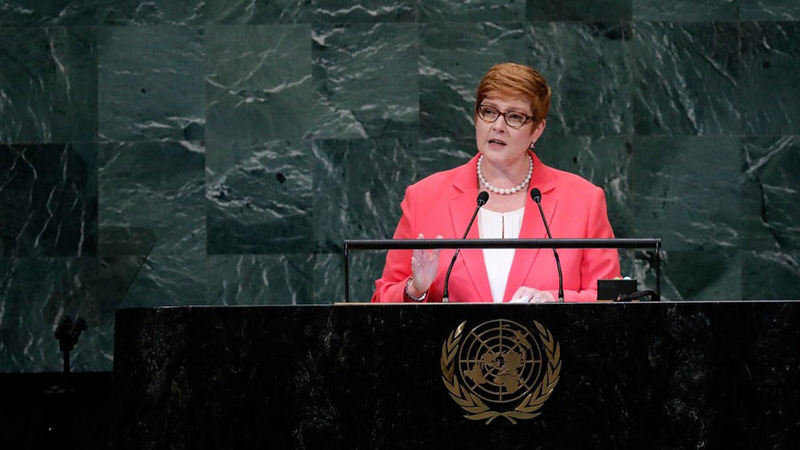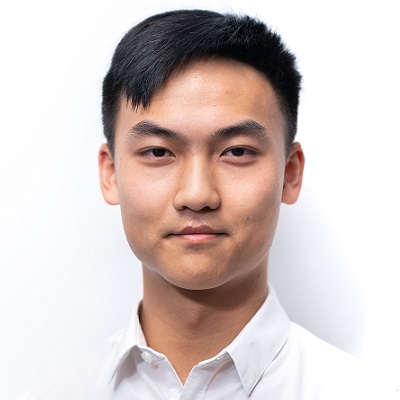The Australian government on Xinjiang
August 02 2019

Since 2016 the Australian government has become increasingly vocal about human rights as an issue of concern with the People’s Republic of China (PRC). Recently this has focused on the mass detention and forced indoctrination of the PRC’s Turkic Muslim population in the northwest province of Xinjiang. Prior to 2016, the PRC’s human rights record was primarily confined to closed-door discussions between Australian and PRC government officials. However, escalating human rights violations, including the rapidly deteriorating situation in Xinjiang, and Beijing’s refusal since 2014 to participate in the high-level bilateral human rights dialogue established with Australia in 1997, in addition to increasing domestic and international scrutiny, has nudged forward a relatively louder stance by the Australian government, as well as greater Australian engagement in joint, coordinated messaging with other countries.
The Australian government has elected to stay a diplomatic course in expressing its concerns about human rights matters in the PRC, deciding against an escalation beyond verbal protests for the moment. For example, it has ruled out targeted sanctions against those linked to abuses in Xinjiang, most recently on July 24 in Parliament. Foreign Minister Marise Payne stated that Australia would continue on with its diplomatic push: ‘I think it is very important for the government to work in the way that we are, and we will continue to do so.’[1] She noted that the Australian government’s ‘next steps’ would include continuing to ‘seek the support of the government in China…for an opportunity to visit the region and to enable others to visit the region…’[2]
The Opposition Labor Party has articulated broad support for the government’s current approach, most recently on July 25, and the actions it has taken to date.[3]
This fact sheet collates Australian government statements on the PRC’s human rights violations, with a focus on Xinjiang – what has been said, when and by whom?
September 26 2014
The Australian Department of Foreign Affairs and Trade (DFAT) issued a statement criticising the PRC’s imposition of a life sentence on Uighur scholar Ilham Tohti for separatism. He had been vocal about the need to reduce tensions in Xinjiang and an advocate for Uighur rights and Uighur-Han reconciliation.
The statement said:[4]
Australia is deeply concerned by the harsh sentence handed down to Ilham Tohti, who has consistently advocated peaceful dialogue as a means to address ethnic tensions in Xinjiang.
March 10 2016
The US Ambassador to the United Nations (UN) delivered a joint statement at the UN Human Rights Council (UNHRC), to which Australia was one of the 12 signatories.[5]
The statement noted the group’s concern ‘about China’s deteriorating human rights record’, citing ‘the arrests and ongoing detention of rights activists, civil society leaders, and lawyers [and their lack of access to legal counsel or family visits]…recent disappearances and apparent coerced returns of Chinese and foreign citizens from outside mainland China…the increasing number of individuals whose confession have been aired on state media prior to any incitement or judicial process.’[6]
February 27 2017
Australia joined 10 other nations[7] in signing a letter addressed to Guo Shengkun, the PRC’s then-Minister of Public Security, expressing ‘growing concern over recent claims of torture and other cruel, inhuman or degrading treatment or punishment in cases concerning detained human rights lawyers and other human rights defenders’. It called on the PRC to end its practice of ‘residential surveillance at a designated place’, stating that it amounted to ‘incommunicado detention in secret places, putting detainees at a high risk of torture or ill-treatment’.[8]
July 2018
Following a US Congressional-Executive Commission on China hearing on July 26 on the increasing repression of the Uighur population in Xinjiang, exiled Uighur leader Rebiya Kadeer urged Australia to ‘call on China to stop engaging in state terrorism’.[9]
Then-Foreign Minister Julie Bishop said Australia ‘shares concerns expressed by the international community’ and that Australian officials ‘have conveyed these concerns to China on a number of occasions’.[10]
At this point in time, as was then noted by Fairfax Media, the Australian government had not yet raised the issue in any significant public forum.[11]
September 11 2018
During the UNHRC's 39th session, Australia, for the first time in this particular forum, emphasised recent developments in Xinjiang as a particular area of concern:[12]
Australia is concerned by the continued targeting of specific groups, including…in China’s Xinjiang Uighur Autonomous Region.
This followed an August 10 report by the UN Committee on the Elimination of Racial Discrimination (CERD) that it had received ‘many numerous and credible reports’ that Xinjiang had been transformed ‘into something that resembles a massive internment camp’,[13] Australian citizens as well as friends and relatives of Australian citizens being detained in Xinjiang.’[14]
On the same day, in her first comments on Xinjiang, Foreign Minister Marise Payne repeated her predecessor’s July statement on Xinjiang:[15]
The Australian government is concerned about the situation in China’s Xinjiang Uighur Autonomous Region. Our officials have conveyed these concerns to China on a number of occasions, including concerns over relatives of Uighur Australians.
November 6 2018
Asked in an interview about ‘how worried’ Australia was by the construction of sprawling internment camps in Xinjiang, the Foreign Minister repeated her September formulation on the matter, but upped ‘concern’ to ‘serious concern’:[16]
[W]e do have serious concerns about the human rights situation in Xinjiang. We’ve expressed those concerns directly to the Chinese Ambassador in Canberra and as well as the foreign ministry in Beijing.
On the same day, at the UNHRC’s 31st session of the Universal Periodic Review (UPR) of China, Australia delivered its strongest statement on Xinjiang yet.
Australia outlined a host of human rights concerns but placed particular emphasis on the PRC’s treatment of its Turkic Muslim population in the province.[17] The statement was delivered immediately before the Foreign Minister’s visit to Beijing (November 7-8) for the fifth Australia-China Foreign and Strategic Dialogue. This was the first official visit by an Australian foreign minister in 18 months following the diplomatic ‘freeze’ set in place by the PRC.
The statement noted:
Australia shares the UN CERD’s alarm at numerous reports of detention of large numbers of ethnic Uighurs and other Muslim groups held incommunicado and often for long periods without being charged or tried, which exacerbates rather than prevents religious extremism; and reports of mass surveillance disproportionately targeting ethnic Uighurs and Tibetans.
Australia recommends that China cease the practice of arbitrarily detaining Uighurs and other Muslim groups in Xinjiang, which is more likely to exacerbate than prevent religious extremism; and, as recommended by UN CERD, immediately release individuals currently detained. Australia recommends China cease restrictions, including military and police measures, on Uighurs’ and Tibetans’ freedom of movement. Australia recommends that China allow access to Tibet and Xinjiang by the UN High Commissioner on Human Rights and Special Procedures mandate-holders. Australia recommends that China strengthen measures to prevent torture and ill-treatment committed against religious and ethnic groups as recommended by UN CERD.
This statement was made following DFAT confirmation at a Senate Estimates hearing on October 25 that at least three Australians had been detained in Xinjiang ‘for a matter of weeks’. While they had subsequently returned to Australia, DFAT’s representative, Graham Fletcher, then-head of its North Asia Division, noted DFAT had only been made aware of the detentions after the fact.
Mr Fletcher also highlighted the difficulties DFAT had been facing in securing cooperation from Beijing to locate Australian residents’ family and friends based in Xinjiang. He stated that while Australian diplomats had previously sporadically been able to visit Xinjiang, requests to visit the region had been refused for the past 18 months.[18]
November 8 2018
Following their discussions at the fifth Australia-China Foreign and Strategic Dialogue, Minister Payne during a joint press conference with PRC Foreign Minister Wang Yi confirmed that she had pursued the matter of Xinjiang during their meeting.[19]
November 15 2018
On November 15 2018, it was reported that the Australian ambassador to the PRC joined heads of mission in Beijing from 14 other countries[20] in signing a letter, the drafting of which had reportedly been led by Canada, to Chen Quanguo, the Communist Party Secretary of Xinjiang, requesting a meeting to discuss the situation in Xinjiang:[21]
We are deeply troubled by reports of the treatment of ethnic minorities, in particular individuals of Uyghur ethnicity, in the Xinjiang Uyghur Autonomous Region.
In order to better understand the situation, we request a meeting with you at your earliest convenience to discuss these concerns.
(From draft text)
February 25 2019
In an address to the high-level segment of the 40th session of the UNHRC, Minister Payne nominated ‘the treatment of Uighurs in China’ as a noted matter of concern for Australia.[22]
March 12 2019
Australia’s focus on Xinjiang was reflected in a statement to the UNHRC’s 40th session, which said:[23]
Australia remains concerned by the situation in Xinjiang, including reports of enforced disappearances, arbitrary detention and restrictions on freedom of movement.
July 3 2019
Australia reteiterated this concern at the UNHRC's 41st session, adding:[24]
We call upon China to allow the OHCHR independent access to monitor and report on the human rights situation in Xinjiang.
July 8 2019
Australia joined 21 other countries[25] in submitting a statement to the UNHRC High Commissioner condemning the PRC’s mass detention of Turkic Muslims in Xinjiang. This marked ‘the first major collective international challenge’ to the PRC’s actions in the province.[26]
It read:[27]
We…are concerned about credible reports of arbitrary detention in large-scale places of detention, as well as widespread surveillance and restrictions, particularly targeting Uighurs and other minorities in Xinjiang, China.
We call on China…to respect human rights and fundamental freedoms, including freedom of religion or belief, in Xinjiang and across China. We call also on China to refrain from the arbitrary detention and restrictions on freedom of movement of Uighurs, and other Muslim and minority communities in Xinjiang.
July 12 2019
Asked during a press conference with New Zealand Foreign Minister Winston Peters on July 12 what prompted Australia and New Zealand to sign the July 8 joint statement, Minister Payne said:[28]
I think the [joint statement] reflects an increased international focus on concerning developments in Xinjiang. Australia, for our part, has raised our concerns about those human rights situations with China in a number of contexts and of course it is an appropriate international forum for those issues to be raised…
July 15 2019
In her first fairly detailed interview on Xinjiang, Minister Payne was pressed on Australia’s response to Xinjiang, and whether it could be more ‘muscular’. She reiterated throughout the interview that ‘engagement through bodies such as the Human Rights Council is an appropriate place and way in which to human rights concerns’, inaddition to taking up matters ‘directly with Chinese counterparts.’[29]
July 24 2019
An Australian Greens Senator in Parliament asked Minister Payne when the government would ‘impose targeted sanctions, like visa bans and asset freezes, against those linked to abuses in Xinjiang?’[30]
She responded:
I don’t agree with the approach that the Australian Greens suggest in this regard. I think it is very important for the government to work in the way that we are, and we will continue to do so.
Asked about what Australia’s next steps might be following the July 8 joint statement at the UNHRC, Minister Payne said:
In terms of next steps, we seek the support of the government in China – and we have continued to do so – for an opportunity to visit the region and to enable others to visit the region – which they have indicated in the past there is some preparedness to do.
This fact sheet was prepared by Elena Collinson, Senior Project and Research Officer, and Michael Zhou, Project and Research Officer at the Australia-China Relations Institute, University of Technology Sydney.
Sources
[1] Questions without notice – China: Human rights, Senate Hansard, Parliament of Australia, July 24 2019 <https://www.aph.gov.au/Parliamentary_Business/Hansard/Hansard_Display?bid=chamber/hansards/f1e272cd-753f-4b97-bfb4-516fc5f0f19d/&sid=0110>.
[2] Ibid.
[3] Motions – China: Human rights, Senate Hansard, Parliament of Australia, July 25 <https://www.aph.gov.au/Parliamentary_Business/Hansard/Hansard_Display?bid=chamber/hansards/19913c37-580e-4f72-b1ef-2ea64dfb5ea3/&sid=0096>. See also Penny Wong, interview, Radio Adelaide, Australian Broadcasting Corporation, transcript, November 21 2018 <http://www.pennywong.com.au/transcripts/abc-radio-adelaide-super-wednesday-16/>.
[4] Lisa Murray, ‘Australia condemns Uighur life sentence’, September 26 2014, The Australian Financial Review <https://www.afr.com/news/policy/foreign-affairs/australia-condemns-uighur-life-sentence-20140926-jk7h7>.
[5] The 12 signatories were Australia, Denmark, Finland, Germany, Iceland, Ireland, Japan, Norway, the Netherlands, Sweden, the UK and the US.
[6] Keith Harper, ‘Joint statement – human rights situation in China’, US Mission to International Organisations in Geneva, March 10 2016 <https://geneva.usmission.gov/2016/03/10/item-2-joint-statement-human-rights-situation-in-china/>.
[7] The 11 signatories were Australia, Belgium, Canada, the Czech Republic, Estonia, France, Germany, Japan, Sweden, Switzerland and the UK.
[8] Nathan Vanderklippe, ‘Canada, 10 other countries call out China for torturing human rights lawyers’, The Globe and Mail, March 20 2017 <https://www.theglobeandmail.com/news/world/canada-10-other-countries-call-out-china-for-torturing-human-rights-lawyers/article34346186/>.
[9] David Wroe, ‘Islam’s ‘Dalai Lama’ urges Australia to speak out against China’s police state’, The Sydney Morning Herald, July 29 2018 <https://www.smh.com.au/politics/federal/islam-s-dalai-lama-urges-australia-to-speak-out-against-china-s-police-state-20180727-p4zu06.html>.
[10] Ibid.
[11] Ibid.
[12] Australian Government Department of Foreign Affairs and Trade, 'Human Rights Council 39th session general debate on item 4 - Australian statement', September 11 2018 <https://dfat.gov.au/international-relations/international-organisations/un/unhrc-2018-2020/statements/Documents/39th-hrc-statement-in-the-general-debate-high-commissioner-for-human-rights.docx>.
[13] Stephanie Nebehay, 'U.N. says it has credible reports that China holds million Uighurs in secret camps', Reuters, August 10 2018 <https://www.reuters.com/article/us-china-rights-un/u-n-says-it-has-credible-reports-that-china-holds-million-uighurs-in-secret-camps-idUSKBN1KV1SU>.
[14] Lisa Murray, 'Australian families left devastated by China's mass detention of Uighurs in Xinjiang', The Australian Financial Review, August 17 2018 <https://www.afr.com/world/australian-families-left-devastated-by-chinas-mass-detention-of-uighurs-in-xinjiang-20180815-h13zox>.
[15] Michael Smith, ‘Call for Canberra to pressure China over Muslim detention camps’, The Australian Financial Review, September 11 2018<https://www.afr.com/news/world/asia/call-for-canberra-to-pressure-china-over-muslim-detention-camps-20180911-h157qj>.
[16] Marise Payne, interview, AM, Australian Broadcasting Corporation, transcript, November 6 2018 <https://foreignminister.gov.au/transcripts/Pages/2018/mp_mr_181106.aspx?w=E6pq%2FUhzOs%2BE7V9FFYi1xQ%3D%3D>.
[17] Australian Government Department of Foreign Affairs and Trade, 31st UN Human Rights Council Universal Periodic Review of China, November 6 2018 <https://dfat.gov.au/international-relations/international-organisations/un/unhrc-2018-2020/universal-periodic-review/Documents/31st-session-upr-china.pdf>.
[18] Graham Fletcher, Senate Hansard, Parliament of Australia, October 25 2018 <https://parlinfo.aph.gov.au/parlInfo/search/display/display.w3p;query=Id:%22committees/estimate/726eefc8-0a12-4c57-8016-8d4e4fe45117/0000%22>.
[19] Marise Payne, joint press conference with the Foreign Minister of the People's Republic of China, Beijing, transcript, November 8 2018 <https://foreignminister.gov.au/transcripts/Pages/2018/mp_tr_181108.aspx?w=E6pq%2FUhzOs%2BE7V9FFYi1xQ%3D%3D>.
[20] The 15 ambassadors represented Australia, Belgium, Canada, Denmark, Estonia, the European Union, Finland, France, Germany, Ireland, the Netherlands, Norway, Sweden, Switzerland and the UK.
[21] Philip Wen, Michael Martina and Ben Blanchard, ‘Exclusive: in rare coordinated move, Western envoys seek meeting on Xinjiang concerns’, Reuters, November 15 2018 <https://www.reuters.com/article/us-china-xinjiang-exclusive/exclusive-in-rare-coordinated-move-western-envoys-seek-meeting-on-xinjiang-concerns-idUSKCN1NK0H0>.
[22] Marise Payne, ‘UN Human Rights Council’, Australian Government Department of Foreign Affairs and Trade, speech, February 25 2019 <https://foreignminister.gov.au/speeches/Pages/2019/mp_sp_190225.aspx?w=E6pq%2FUhzOs%2BE7V9FFYi1xQ%3D%3D>.
[23] Australian Government Department of Foreign Affairs and Trade, 'Human Rights Council 40th session general debate on item 4 - Australian statement', March 12 2019 <https://dfat.gov.au/international-relations/international-organisations/un/unhrc-2018-2020/statements/Documents/40th-hrc-national-statement-general-debate-item-4.pdf>.
[24] Australian Government Department of Foreign Affairs and Trade, 'Human Rights Council 41st session general debate on item 4 - Australian statement', July 3 2019 <https://dfat.gov.au/international-relations/international-organisations/un/unhrc-2018-2020/statements/Documents/41st-hrc-national-statement-item-4-general-debate.pdf>.
[25] The 22 countries were Australia, Austria, Belgium, Canada, Denmark, Estonia, Finland, France, Germany, Iceland, Ireland, Japan, Latvia, Lithuania, Luxembourg, the Netherlands, New Zealand, Norway, Spain, Sweden, Switzerland and the UK.
[26] Ben Westcott and Jo Shelley, ‘22 countries sign letter calling on China to close Xinjiang Uyghur camps’, CNN, July 11 2019 <https://edition.cnn.com/2019/07/11/asia/xinjiang-uyghur-un-letter-intl-hnk/index.html>.
[27] Human Rights Watch, ‘UN: unprecedented joint call for China to end Xinjiang abuses’, July 10 2019 <https://www.hrw.org/news/2019/07/10/un-unprecedented-joint-call-china-end-xinjiang-abuses>.
[28] Marise Payne, joint press conference with the Foreign Minister of New Zealand, Auckland, transcript, July 12 2019 <https://foreignminister.gov.au/transcripts/Pages/2019/mp_tr_190712.aspx?w=E6pq%2FUhzOs%2BE7V9FFYi1xQ%3D%3D>.
[29] Marise Payne, interview, RN Breakfast, Australian Broadcasting Corporation, transcript, July 15 2019 <https://foreignminister.gov.au/transcripts/Pages/2019/mp_tr_190715.aspx?w=E6pq%2FUhzOs%2BE7V9FFYi1xQ%3D%3D>.
[30] Questions without notice – China: Human rights, Senate Hansard, Parliament of Australia, July 24 2019 <https://www.aph.gov.au/Parliamentary_Business/Hansard/Hansard_Display?bid=chamber/hansards/f1e272cd-753f-4b97-bfb4-516fc5f0f19d/&sid=0110>.


